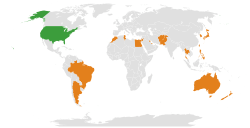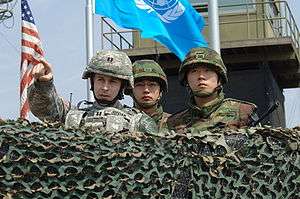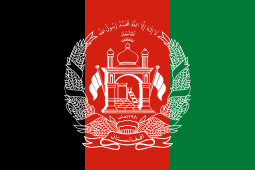Major non-NATO ally
Major non-NATO ally (MNNA) is a designation given by the United States government to close allies that have strategic working relationships with the US Armed Forces but are not members of the North Atlantic Treaty Organization (NATO). While the status does not automatically include a mutual defense pact with the United States, it still confers a variety of military and financial advantages that otherwise are not obtainable by non-NATO countries.
Major non-NATO ally | |
|---|---|
 United States in green. Major non-NATO ally in orange. | |
| Type | Non-NATO military alliances with the United States. |
| Members | 18 countries
|
| Establishment | 1989 |
History

MNNA status was first created in 1989 when section 2350a, otherwise known as the Sam Nunn Amendment, was added to Title 10 (Armed Forces) of the United States Code by Congress.[1] It stipulated that cooperative research and development agreements could be enacted with non-NATO allies by the Secretary of Defense with the concurrence of the Secretary of State. The initial MNNAs were Australia, Egypt, Israel, Japan, and South Korea. In 1996, major non-NATO allies received additional military and financial benefits when section 2321k was added to Title 22 (Foreign Relations) of the U.S. Code (also known as section 517 of the Foreign Assistance Act of 1961), which added MNNAs to many of the same exemptions from the Arms Export Control Act that were enjoyed by NATO members. It also authorized the President to designate a nation as an MNNA thirty days after notifying Congress.[2] When enacted, the statute designated the initial five countries as major non-NATO allies, and added Jordan and New Zealand to the list.
U.S.-New Zealand strategic and military cooperation suffered a setback after the breakdown of the ANZUS alliance in 1984 over nuclear ship entry. The designation of New Zealand as an MNNA reflected the warming of relations between the two. In June 2012 New Zealand signed a partnership arrangement with NATO further strengthening and consolidating relations.
When Congress enacted on September 30, 2002 the Foreign Relations Authorization Act for FY 2003, it required that Taiwan be "treated as though it were designated a major non-NATO ally."[3] Despite some initial misgivings about Congress's perceived intrusion into the President's foreign affairs authority, the Bush administration subsequently submitted a letter to Congress on August 29, 2003, designating Taiwan as a major non-NATO ally.[3]
_selectees_perform_morning_colors_on_board_Naval_Support_Activity_(NSA)_Bahrain.jpg)
.jpg)
In 2014, following the 2014 Crimean Crisis, a bill was introduced to the United States Congress to grant major non-NATO ally status to Georgia, Moldova, and Ukraine.[4] In May 2015, US President Barack Obama declared his intention to make Tunisia a non-NATO ally while hosting his Tunisian counterpart Beji Caid Essebsi at the White House. During a 2015 Camp David summit with the Gulf Cooperation Council states, the Obama administration considered designating Saudi Arabia, the United Arab Emirates, Oman, and Qatar as MNNAs.[5]
The designation of certain countries as major non-NATO allies has not been without controversy. US Representatives Ted Poe (R-TX) and Rick Nolan (D-MN) introduced H.R. 3000, a bill to revoke Pakistan's position as an MNNA, citing inadequate counterterrorism efforts, the harboring of Osama bin Laden and Pakistani support for the Taliban.[6]
In 2017, General Joseph Dunford, chairman of the Joint Chiefs of Staff, accused Pakistan's Inter-Services Intelligence (ISI) of having ties to terror groups.[7] Reuters reported that "possible Trump administration responses being discussed include expanding U.S. drone strikes and perhaps eventually downgrading Pakistan’s status as a major non-NATO ally."[8]
In 2019, Donald Trump designated Brazil as a major non-NATO ally[9] after receiving a working visit from Brazilian President Jair Bolsonaro.[10] A bill to make Ukraine a major non-NATO ally was introduced into the US House of Representatives in May 2019.[11] In June 2019 US lawmakers provided for enhancements to India's status, though this fell short of making them a MNNA.[12][13]
Benefits
Nations named as major non-NATO allies are eligible for the following benefits:[14]
- entry into cooperative research and development projects with the Department of Defense (DoD) on a shared-cost basis
- participation in certain counter-terrorism initiatives
- purchase of depleted uranium anti-tank rounds
- priority delivery of military surplus (ranging from rations to ships)
- possession of War Reserve Stocks of DoD-owned equipment that are kept outside of American military bases
- loans of equipment and materials for cooperative research and development projects and evaluations
- permission to use American financing for the purchase or lease of certain defense equipment
- reciprocal training
- expedited export processing of space technology
- permission for the country's corporations to bid on certain DoD contracts for the repair and maintenance of military equipment outside the United States
Major Strategic Partner
In December 2014 the US House passed the United States–Israel Strategic Partnership Act of 2013.[15] This new category would have placed Israel one notch above the Major Non-NATO Ally classification and would have added additional support for defense, energy, and strengthen cooperation business and academics.[16] The bill additionally called for the US to increase their war reserve stock in Israel to US$1.8 billion.[17] The bill did not reach a vote, and as such did not pass or become law.
List of MNNAs
The following countries have been designated as major non-NATO allies of the United States (in order of their appointment):[18][19][20]
Named by George H. W. Bush


Named by George W. Bush
Named by Barack Obama


References
- Title 10, section 2350a of U.S. Code Archived 2012-07-21 at the Wayback Machine
- 22 U.S.C. § 2321k
- Kan, Shirley (December 2009). Taiwan: Major U.S. Arms Sales Since 1990. DIANE Publishing. p. 52. ISBN 978-1-4379-2041-3.
- H.R. 5782 - Ukraine Freedom Support Act of 2014
- Toosi, Nahal (14 May 2015). "U.S. may raise Arab states to 'major' ally status". Politico. Retrieved 14 May 2015.
- "CONGRESSMEN POE AND NOLAN INTRODUCE BILL REVOKING PAKISTAN'S MNNA STATUS". Retrieved 31 July 2017.
- "General Dunford: Pakistan intelligence has links to 'terrorists'". Al-Jazeera. October 4, 2017.
- "Mattis says will try to work with Pakistan 'one more time'". Reuters. October 3, 2017.
- "Major Non-NATO Ally Status". United States Department of State. Retrieved 2020-05-07.
- "Trump bumps up Brazil to 'major non-NATO' ally".
- "Ukraine might be designated as major non-NATO US ally". Kyiv Post. 2019-06-01. Retrieved 2019-06-30.
- "US Senate okays non-Nato ally status for India". Retrieved 29 Aug 2019.
- Iwanek, Krzysztof (2019-08-01). "No, India Isn't a 'Major Non-NATO Ally' of the United States". The Diplomat.
- "Major Non-NATO Ally (MNNA)". globalsecurity.org. September 15, 2012. Retrieved July 24, 2018.
- "Congress enshrines Israel in a new class of ally". The Jerusalem Post - JPost.com. Retrieved 20 May 2016.
- "US Congress passes Israel strategic partnership bill". The Times of Israel. Retrieved 20 May 2016.
- "US Congress passes Israel strategic partnership bill". Retrieved 20 May 2016.
- "Major Non-NATO Ally Status". US State Department. Retrieved 2020-03-29.
- "Code of Federal Regulations - Title 22 - Foreign Relations - § 120.32Major non-NATO ally". United States Government Publishing Office. Retrieved 2017-02-04.
- "22 USC 2321k: Designation of major non-NATO allies". United States Government Publishing Office. Retrieved 2017-02-04.
- "U.S. declares Afghanistan major non-NATO ally to ensure the nation gets defense aid beyond 2014 troop withdrawal - Daily Mail Online". Mail Online. 7 July 2012. Retrieved 20 May 2016.
- Stearns, Scott (2012-07-07). "Afghanistan Designated Major US Ally During Clinton Visit to Kabul". Voanews.com. Retrieved 2014-01-31.
- "Overview of U.S. Policy Toward South America and the President's Upcoming Trip to the Region". Retrieved 20 May 2016.
- "Bahrain Joins Iran in Opposing Strike". Fox News. Associated Press. August 18, 2002. Retrieved July 7, 2012.
- "Bush 'upgrades' Philippines". CNN. May 20, 2003. Retrieved July 7, 2012.
- Despeignes, Peronet (October 20, 2003). "U.S. wants APEC agenda to include security issues". USA Today. Retrieved July 7, 2012.
- "US tightens military relationship with Kuwait". Associated Press. January 15, 2004. Archived from the original on January 29, 2013. Retrieved July 7, 2012.(subscription required)
- "US rewards Morocco for terror aid". BBC News. June 4, 2004. Retrieved July 7, 2012.
- http://www.southasiaanalysis.org/papers10/paper959.html South Asia Analysis Group Archived April 24, 2012, at the Wayback Machine
- "Hillary Clinton says Afghanistan 'major non-Nato ally'". BBC News. July 7, 2012. Retrieved July 7, 2012.
- United States Department of State
- "Designation of Tunisia as a Major Non-NATO Ally". U.S. Department of State. Retrieved 20 May 2016.
- "Memorandum on the Designation of the Federative Republic of Brazil as a Major Non-NATO Ally". White House. July 31, 2019.
- "Message to the Congress on Designating Brazil as a Major Non-NATO Ally". White House. May 8, 2019.